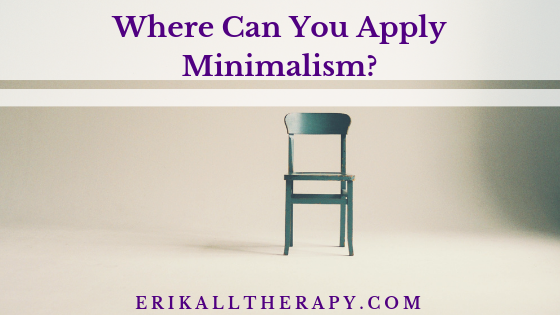Where Can You Apply Minimalism?
Minimalism is often thought of as decluttering your physical items. Marie Kondo’s book, Netflix show, and philosophy are wildly popular and given people accessible information on how to organize and declutter. She’s amazing at what she does! However, that’s really the tip of the iceberg when it comes to exploring minimalism, which I think Marie Kondo would agree to as well.
Clutter can be seen throughout many areas of our lives and influences more than cleaning up a previous out of control mess. Minimalism is about making intentional decisions in what to let go of from our lives, but also changing the process of what we allow in. It’s about only making space for the items, thoughts, relationships, time, and attention that truly add value and meaning to our lives. In the next several posts of this questioning minimalism series, I will explore mental, digital, emotional, and relationship clutter, but in the spirit of curation, today’s focus is on physical clutter.
Physical Clutter
The most obvious and tangible place to start is with your physical clutter. What comes up for you when you consider getting rid of some of your items? What do those items mean to you? Some people attach emotional meaning to inanimate objects or associate items with memories of loved ones.
A plethora of designer clothes or nice cars may represent one’s status or perceived level of wealth or happiness. Collections may be a display of your hobby or talents. You could be engaged in a scarcity mindset of wanting additional items now when you can afford them because something could happen down the line and you won’t be able to get what you need. And my favorite, keeping things “just in case” you need them one day.
My House is Clean and Organized, So I Don’t Have a Clutter Problem
There’s a misperception that people must be hoarders or have stuff everywhere before they’re ready to embrace a minimalist lifestyle. I think that’s a pretty common issue, but it’s certainly not the only way that physical clutter presents. Oftentimes people are able to keep clean and organized homes that actually contain significant clutter.
If you have items that you are not using or if you consume without putting thought into your purchases or acquisitions, you are bringing extraneous items into your life which is creating clutter. You may also be holding onto items for sentimental reasons, like family heirlooms or t-shirts from your first concert that you’ll never wear again. Collecting is another hobby in which many items are likely going unused.
If any of the things I mention are being utilized for a purpose, add value to your life, or feel meaningful to you, I’d never consider them clutter. However, I’m challenging you to consider if these things bring real value or perceived value, and ask yourself why you’re holding onto them.
Clutter is Just Postponed Decisions
Barbara Hemphill, author and expert of removing clutter in organizational settings, has declared that clutter is postponed decisions, and I tend to agree. Why do we hold onto so much stuff? I find it’s often because we are scared of letting it go.
Do you have a system in place for letting go of or bringing items into your life? Probably not, most people don’t. I’d also be curious if you bring in or hold onto more things if you’re facing something difficult in your life, like making a change or struggling in a relationship. When we’re up against making hard decisions, we typically avoid, especially at first.
A quick and easy way to escape from those uncomfortable feelings is to consume, to collect, to buy something to make ourselves feel better, to get the item that will complete our lives or build our dreams. Do those things really make you feel better, or are you just postponing decisions? Is stagnation more comfortable than vulnerability?
Getting Started
A fun way to get started dealing with your physical clutter even if you haven’t fully committed to the idea of minimalism is playing the Minimalist Game where you start at the beginning of the month and give away the number of items that corresponds to the day of the month. On the 1st you give away 1 item, on the 2nd you give 2 items, etc. By the end of the month you will have cleared almost 500 items out of your space! Stop postponing, and do something now to clear your clutter. Let us know in the comments what you’ve decluttered from your space recently.

